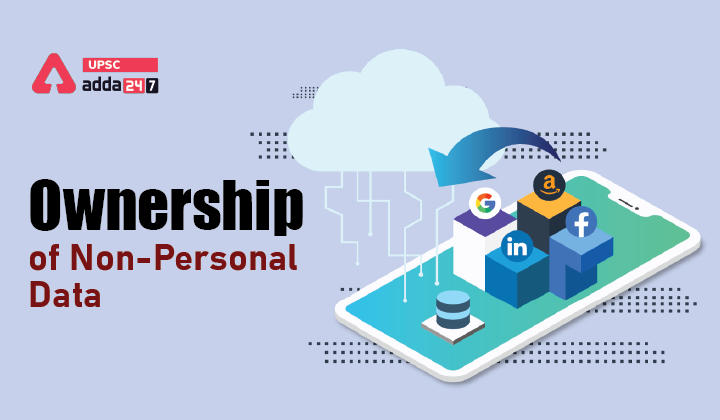Table of Contents
OWNERSHIP OF NON-PERSONAL DATA–Relevance for UPSC Exam
GENERAL STUDIES III- Awareness in the fields of IT, Space, Computers, robotics, Nano-technology, bio-technology and issues relating to intellectual property rights.
IN NEWS
· THE Government could look at clearly defining “ownership” of non-personal data held by big-tech platforms, such as Google, Meta and Amazon, if they refuse to share such data with a regulator as proposed in the draft National Data Governance Framework.
WHAT IS NON-PERSONAL DATA?
· Non-personal data is any data set that does not contain personally identifiable information including aggregated information, such as the overall health data of a particular demography, weather and climate data of an area, and traffic data, among others. For example, order details collected by a food delivery service will have the name, age, gender, and other contact information of an individual, it will become non-personal data if the identifiers such as name and contact information are taken out.
·Non-personal data can be classified into three main categories, namely public non-personal data, community non-personal data and private non-personal data.
·Data collected by government and its agencies such as census, data collected by municipal corporations on the total tax receipts in a particular period or any information collected during execution of all publicly funded works has been kept under the umbrella of public non-personal data.
·Any data identifiers about a set of people who have either the same geographic location, religion, job, or other common social interests will form the community non-personal data. E.g., the metadata collected by ride-hailing apps, telecom companies, electricity distribution companies
·Private non-personal data can be defined as those which are produced by individual which can be derived from application of proprietary software or knowledge. E.g., Data generated by companies like Google, Amazon etc.
·Non-personal data is more likely to be in an anonymized form.
IMPORTANCE OF NON-PERSONAL DATA
- These data sets will help to map consumer biases and ensure targeted delivery of services. It will unlock the doors of economic value and innovation in the country.
SENSITIVENESS OF NON-PERSONAL DATA
·Data related to national security or strategic interests such as locations of government laboratories or research facilities, even if provided in anonymized form can be dangerous.
·Data about the health of a community or a group of communities, though it may be in anonymized form, it can still be dangerous.
GLOBAL STANDARDS ON NON-PERSONAL DATA
·In May 2019, the European Union came out with a regulation framework for the free flow of non-personal data in the European Union, in which it suggested that member states of the union would cooperate with each other when it came to data sharing.
INDIA’s POSITION
A government committee headed by Infosys co-founder Kris Gopalakrishnan has suggested that non-personal data generated in India be allowed to be harnessed by various domestic companies and entities.
- The committee has also suggested a separate national legislation and a separate authority to oversee non-personal data.
- It added further to make it mandatory to share non-personal data as it may be useful for Indian entrepreneurs to develop new and innovative services or products to benefit citizens.
RECOMMENDATIONS
- Formulate a separate legislation to govern non-personal data.
- Setup a new regulatory body– Non-Personal Data Authority (NPDA).
- The report identifies and defines new stakeholders in the non-personal data ecosystem, including data principal, data custodian, data trustee, and data trust, and contours their obligations and mechanisms to enable data sharing.
- It has also set circumstances under which a private organization, that collects non-personal data, needs to be remunerated
ISSUES
- The committee though did not give any recommendation on the benefits that big tech companies will gain from the data as only big tech companies possess the capital and infrastructure to create such large volumes of data. Others will find it difficult to match the capabilities of these technology giants.
- As a signatory to Trade-Related Aspects of Intellectual Property Rights (TRIPS), India extended copyright protection to computer databases in 1999 and there is a challenge of demarcation between non-personal data that cannot be shared, and non-copyright non-personal data that can be used as a public resource.
WHAT CAN BE DONE?
- India will have to define non-personal data in a manner that protects intellectual property rights, serves genuine public interest and promotes innovation.
- India can learn from France’s National Strategy on Artificial Intelligence policy,which encourages economic players to share and pool their data with the state acting as a trusted third party.
- France’s policy even empowers public authorities to impose openness on certain data because of its societal benefits.
- India can also look towards the European Union’s Regulation on the Free Flow of Non-Personal Data,which recognises the free flow of non-personal data as a prerequisite of a competitive economy.



 TSPSC Group 1 Question Paper 2024, Downl...
TSPSC Group 1 Question Paper 2024, Downl...
 TSPSC Group 1 Answer key 2024 Out, Downl...
TSPSC Group 1 Answer key 2024 Out, Downl...
 UPSC Prelims 2024 Question Paper, Downlo...
UPSC Prelims 2024 Question Paper, Downlo...




